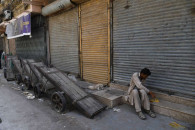Gor Khatri restoration to boost K-P tourism
Historic Peshawar buildings to become heritage sites
1636187892-4/Amir-Khan,-KPK-Tourism-(4)1636187892-4-640x480.webp)
The Khyber-Pakhtunkhwa government has devised a comprehensive plan to designate the historic buildings of the provincial capital, including Gor Gatri, as world heritage sites.
The initiative aims to restore their grandeur through renovations and open them to both domestic and foreign tourists. Adequate funds have been allocated in the provincial budget for this purpose.
This announcement was made by Zahid Chanzeb, Advisor to the Chief Minister on Tourism, Culture, and Archeology, during a detailed visit to the ancient building of Gor Khatri, situated in the center of Peshawar.
During the visit, Director of Archeology and Museums, Dr. Abdul Samad, and Manager Marketing and Cultural Events of the Provincial Culture and Tourism Authority (KPCTA), Madam Haseena, briefed the Advisor on the significant features and historical importance of the 160 x 160 square foot fort. They also provided a tour of the historical picture gallery located in Peshawar.
Zahid Chanzeb inspected British-era fire brigade vehicles and ambulances from 1912, as well as the shops, furnaces, and artisan factories surrounding the fort compound. He was informed that excavations conducted decades ago revealed that the fort, perched on the highest cliff in the Peshawar valley, was constructed by the Greeks, White Huns, and Sassanid invaders between the 2nd and 3rd centuries AD. The fort was named Gor Khatri, which translates to “warrior hero’s tomb,” in honor of the burial of their warrior hero Kanishka.
Over the centuries, Gor Khatri came under the control of various empires, including the Kushan, Sethi, Parthian, Kudra, Hindu Shahi, Ghaznavid, Suri, Mughal, Durrani, Sikh, and British regimes. Jahan Ara Begum, daughter of Mughal Emperor Shah Jahan, constructed an inn for travelers at the site, along with a mosque and two wells.
Published in The Express Tribune, May 27th, 2024.



















COMMENTS
Comments are moderated and generally will be posted if they are on-topic and not abusive.
For more information, please see our Comments FAQ